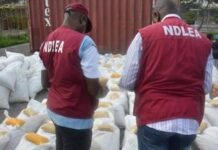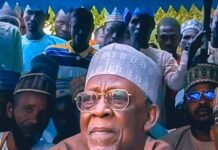Nigeria’s struggle for democracy had been quite thorny from the first and second republics to the June 12, 1993 election, which was annulled, to the present dispensation which has lasted 22 straight years. Throughout this period, there has been the good, the bad and the ugly moments. We have also had players who shaped and have continued to shape, the struggle for the sustenance of Nigeria’s democracy.
Since the declaration of June 12 as Nigeria’s democracy day by President Muhammadu Buhari in 2018, the new date has assumed the status of the nation’s mirror to reflect our journey to democratic governance after so many years of successive military administrations and the struggles that followed to entrench democracy that will stand the test of time.
Nigeria’s first democratic experience after independence was the parliamentary system of government referred to as the First Republic, which had Dr. Nnamdi Azikiwe of the National Council of Nigerian Citizens (NCNC) as president, Sir Abubakar Tafawa Balewa of the Northern Peoples Congress (NPC) as prime minister, and Chief Obafemi Awolowo of the Action Group (AG) as leader of the opposition. There were also four premiers: Sir Ahmadu Bello, Northern Region; Chief Samuel Akintola, Western Region; Chief Michael Okpara, Eastern Region, and Chief Dennis Osadebey, Midwestern Region.
Sadly, the 1966 military coup ended the First Republic and introduced the military regime in the political system of the country, and it went on to dominate the nation’s life.
Nigeria returned to democracy in 1979 when General Olusegun Obasanjo handed over power to Alhaji Usman Aliyu Shehu Shagari of the National Party of Nigeria (NPN) as the elected president after he defeated other political chieftains like Chief Obafemi Awolowo of the Unity Party of Nigeria (UPN), Dr Nnamdi Azikiwe of the Nigeria Peoples Party (NPP), Alhaji Waziri Ibrahim of the Great Nigeria People’s Party (GNPP) and Mallam Aminu Kano of the Peoples Redemption Party (PRP).
As the country struggled to learn the ropes, the Second Republic was brought to a halt by another military coup just three months into President Shagari’s second term.
The attempt to return the country to democracy in 1993 under a two-party system composed of the Social Democratic Party (SDP) and the National Republican Convention (NRC) produced Chief Moshood Abiola (MKO) and Alhaji Bashir Othman Tofa respectively. Surprisingly, SDP fielded a Muslim/Muslim ticket with Chief MKO Abiola and Ambassador Babagana Kingibe as presidential and vice-presidential candidates respectively while NRC had Bashir Tofa and Sylvester Ugoh on the other side.
The June 12, 1993 election was described as fantastic, free, fair and most peaceful election in Nigeria. Nigerians had in that election jettisoned primordial sentiments of religion and ethnicity to elect SDP’s Muslim/Muslim ticket of Abiola and Kingibe with over 8.3 million votes to defeat NRC’s Tofa/Ugoh who scored 5.9 million votes.
The 1993 election gave the nation new hope for national unity and prosperity. However, the results were never announced officially. A court order obtained by one previously unknown group, Association for Better Nigeria (ABN), suspended the process and, eventually, the election was annulled by the then military regime. Today, June 12 has become Nigeria’s symbol of democracy.
Nigeria’s return to democracy in 1999 at a time when the military regime was no longer fashionable globally was celebrated by Nigerians and the international community. Similarly, in what seemed to be a national healing process, the Peoples Democratic Party (PDP) fielded Chief Olusegun Obasanjo who enjoyed a lot of sympathy and support from Nigerians over what was described as wrongful detention by the Abacha regime. The party rode to success and thereafter remained in power for 16 years.
The PDP as a ruling party also had its challenges, producing 12 national chairmen in its 16 years of rule. It started with Chief Barnabas Gemade (999-2001), Chief Audu Ogbeh (2001-2005), Ahmadu Ali (2005-2008), Prince Vincent Ogbulagor (2008-2010), Dr Okwesilieze Nwodo (2010), Dr Haliru Mohammed (2010), Alhaji Kawu Baraje (2011-2014), Bamanga Tukur (2012-2014), Adamu Muazu (2015), Sen. Ali Modu Sheriff (2015-2016), Ahmed Mohammed Makarfi (2015-2016) and Uche Secondus 2017- date.
In 2013, four parties, namely the Action Congress of Nigeria (ACN), All Nigeria Peoples Party (ANPP), All Progressive Grand Alliance (APGA) and Congress for Progressive Change (CPC), merged to oust PDP from power.
Chief Tom Ikimi, a chieftain of the defunct Action Congress of Nigeria (ACN) stated that leaders of the four merging parties had agreed that the need to form a formidable party to wrest power from the Peoples Democratic Party (PDP) in 2015 was more urgent than ever.
“At no time in our national life has the need for radical change become more urgent. And to meet the challenge, we the following political parties, namely, ACN, ANPP, APGA and CPC, have resolved to merge forthwith and become All Progressive Congress (APC) and offer to our beleaguered people a recipe for peace and prosperity,” Ikimi said.
The election of President Muhammadu in 2015 heralded the beginning of the APC administration. The new ruling party started with Chief Bisi Akande as the interim national chairman in 2013, followed by the election of Chief John Odigie-Oyegun in 2014 and Adams Oshiomhole in 2018.
However, Oshiomhole’s reign was submerged in various crises with a litany of litigations. This not only threatened the very existence of the party but was also distracting the APC-led federal government of President Muhammadu Buhari.
On June 25, 2018, the National Executive Committee (NEC) of the ruling APC had to take decisive action to save the party from an imminent collapse. This saw to the constitution of a 13-man Caretaker/Extraordinary Convention Planning Committee under the leadership of Yobe State governor, Hon. Mai Mala Buni.
The decision of the party’s National Executive Committee to dissolve the Adams Oshiomhole-led National Working Committee (NWC) was welcomed by many party faithful; some were, however, skeptical and remained on the fence, while few others with sympathy to Oshiomhole outrightly condemned the entire action.
As a two-term national secretary of the party, Governor Buni brought his experience to bear. He aggressively pursued the founding members of the party, including Chief Bisi Akande and Asiwaju Bola Ahmed Tinubu, among others, to understand why the Caretaker Committee was needed – which was to save the party. His bargaining power for reconciliation through courtesy, humility, respect and throwing the party ownership to the people through the now-famous bottom-up approach quickly cemented relationships with a new trust in the APC.
Buni’s declaration of genuine reconciliation among members was indeed the expected panacea to commence the herculean task of moving the party out of the woods. The sincerity, or otherwise, of this statement was to decide and determine the fate and recovery of the party.
Buni’s style of leadership was to remain neutral, objective and impartial in handling disputes; give everyone what genuinely belongs to them; carry everyone along as demonstrated by the appointment of party members from all factions into various committees, thereby giving everyone a sense of belonging. He is a strong apostle of building a democracy that derives its strength from the electorate.
The reconciliation of intensely contending factions in Zamfara State, for instance, is indeed a case study. APC had lost in Zamfara, Rivers, Cross River and Bayelsa states. However, the internal feuds in these states have been settled. Reports of skirmishes among stakeholders in Kwara, Ogun, Imo and Rivers states are being addressed in order to have a strong and united party in all the state chapters.
Buni’s approach worked like a magnet and, soon, prominent politicians cutting across all political parties, including former PDP chairman Chief Barnabas Gemade, two former Speakers of the House of Representatives, Dimeji Bankole and Yakubu Dogara, former Ogun State governor and director-general of the PDP’s Atiku Abubakar Presidential Campaign Organisation, Otunba Gbenga Daniel, Senator Kabir Marafa, have either rejoined or newly joined the party and paid loyalty to the leadership of the party.
The dates, November 17, 2020 and May 20, 2021, will remain memorable in the history of the All Progressives Congress (APC) and the political history of Nigeria. These were the days serving governors of Ebonyi and Cross River states, Mr Dave Umahi and Prof. Ben Ayade respectively defected from the opposition PDP to the APC.
With his gift of humble approach, political experience and tenacity, Hon. Mai Mala Buni has undoubtedly proved to be a strong source of political stability in Nigeria.
As a politician who started his career at the grassroots as a councillor, then state party chairman, political adviser, national secretary of a party and state governor, this deep-rooted experience has provided him with some added advantage in managing political affairs effectively and efficiently.
He is, indeed, an advocate of internal and true democracy where power truly comes from the people.
Mamman Mohammed is the Director-General Press and Media Affairs to Yobe Gov. Mai Mala Buni.
Follow the Neptune Prime channel on WhatsApp:
Do you have breaking news, interview request, opinion, suggestion, or want your event covered? Email us at neptuneprime2233@gmail.com





